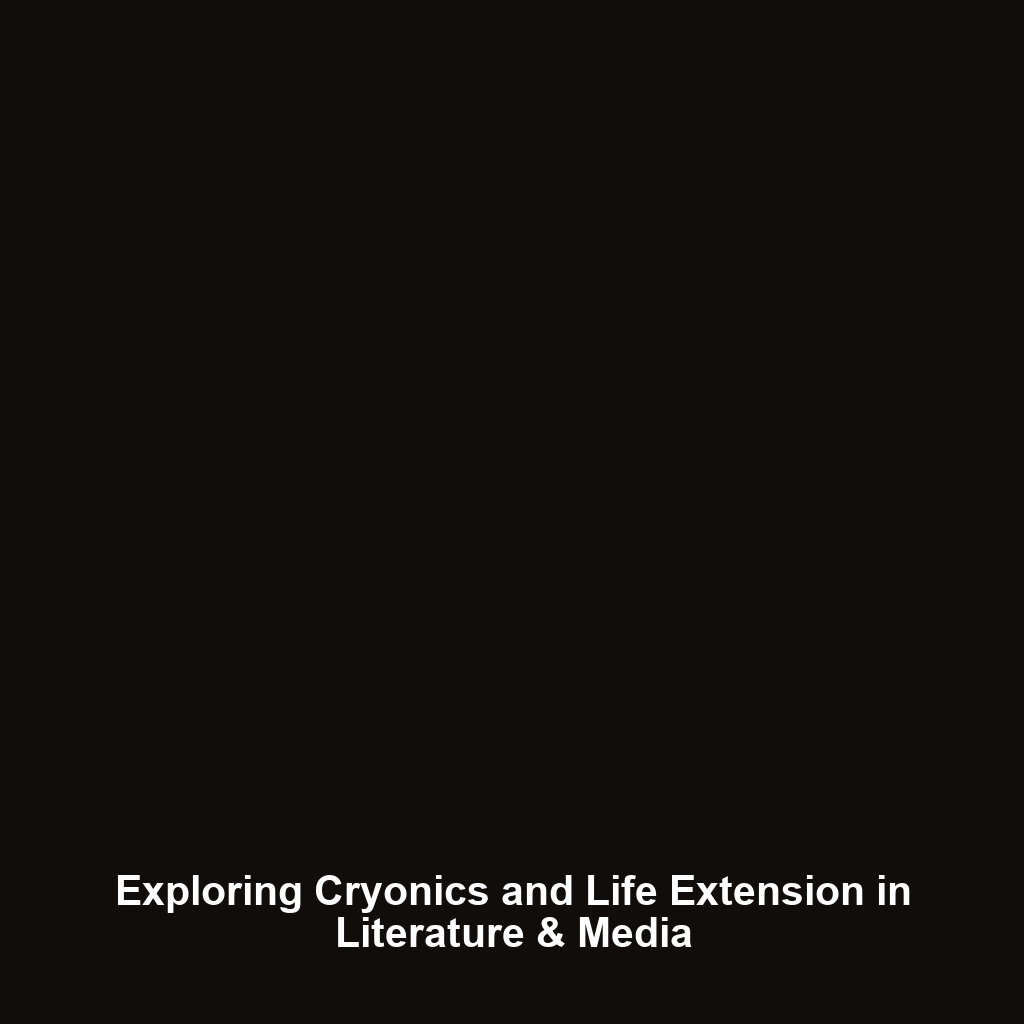Life Extension in Literature and Media
Introduction
Life extension is a captivating topic that has intrigued humanity for centuries, not only in scientific circles but also in literature and media. Its significance lies within the broader context of cryonics and life extension, where the possibilities of extending human lifespan and enhancing vitality are frequently explored. Through various narratives, authors and filmmakers probe the ethical, philosophical, and emotional ramifications of life prolongation. This article delves into the various representations of life extension in literature and media, analyzing its impact and implications for ongoing debates in cryonics and life extension.
Key Concepts
Subtopic 1: Thematic Explorations
Life extension in literature and media often embodies themes of immortality, the human condition, and ethical dilemmas surrounding death. Notable works, such as Mary Shelley’s “Frankenstein” or Isaac Asimov’s stories, highlight the ramifications of defying natural limits. These narratives resonate with contemporary discussions in cryonics and life extension, prompting questions about the nature of existence and the societal impacts of extended life.
Subtopic 2: Scientific Foundation
The principles underlying life extension narratives are deeply rooted in scientific concepts, including cellular repair, regenerative medicine, and genetic manipulation. Authors and filmmakers utilize these scientific foundations to create fictional yet thought-provoking scenarios that challenge readers and viewers to consider the implications of advanced technologies in the pursuit of longevity.
Applications and Real-World Uses
The portrayal of life extension in literature and media offers a lens through which we can examine its real-world applications, particularly in cryonics and life extension strategies. The following points outline how these creative expressions translate into practical uses:
- How narrative shapes public perception: Literature and media raise awareness about cryonics, influencing societal views on life extension techniques.
- Application of bioethical discussions: The ethical considerations portrayed in stories pave the way for discourse in medical practices related to aging.
- Inspiration for scientific exploration: Fictional accounts motivate real-world research into technologies aimed at prolonging life.
Current Challenges
Despite the engaging narratives surrounding life extension in literature and media, several challenges persist in studying and applying these concepts within the broader scope of cryonics and life extension:
- Challenges of ethical dilemmas: The moral implications of extending life raise significant concerns in both narrative and real-life applications.
- Technological limitations: Current scientific advancements may not fully align with the imaginative possibilities explored in media.
- Public skepticism: Misinterpretations from fictional portrayals can lead to misconceptions about the feasibility of life extension.
Future Research and Innovations
The future of life extension in literature and media is likely to be shaped by emerging innovations and scientific breakthroughs. Key developments to watch include:
- Next-gen biotechnology: Advances in genetic editing and regenerative medicine stand to revolutionize our understanding of aging.
- Ethical frameworks: Ongoing discourse will refine ethical guidelines that navigate the complexities introduced by life extension technologies.
- Interdisciplinary collaborations: Increased focus on partnerships among scientists, authors, and ethicists to create responsible narratives in media that reflect realistic advancements.
Conclusion
Life extension in literature and media serves as a powerful conduit for exploring the profound implications of extending human life within the context of cryonics and life extension. As we reflect on the insights provided by these artistic representations, we can better appreciate the ongoing discussions that bridge fiction and reality. For those interested in delving further, we recommend exploring our comprehensive articles on [Cryonics Research](#) and [Ethics in Life Extension](#) to stay informed on these critical issues.
